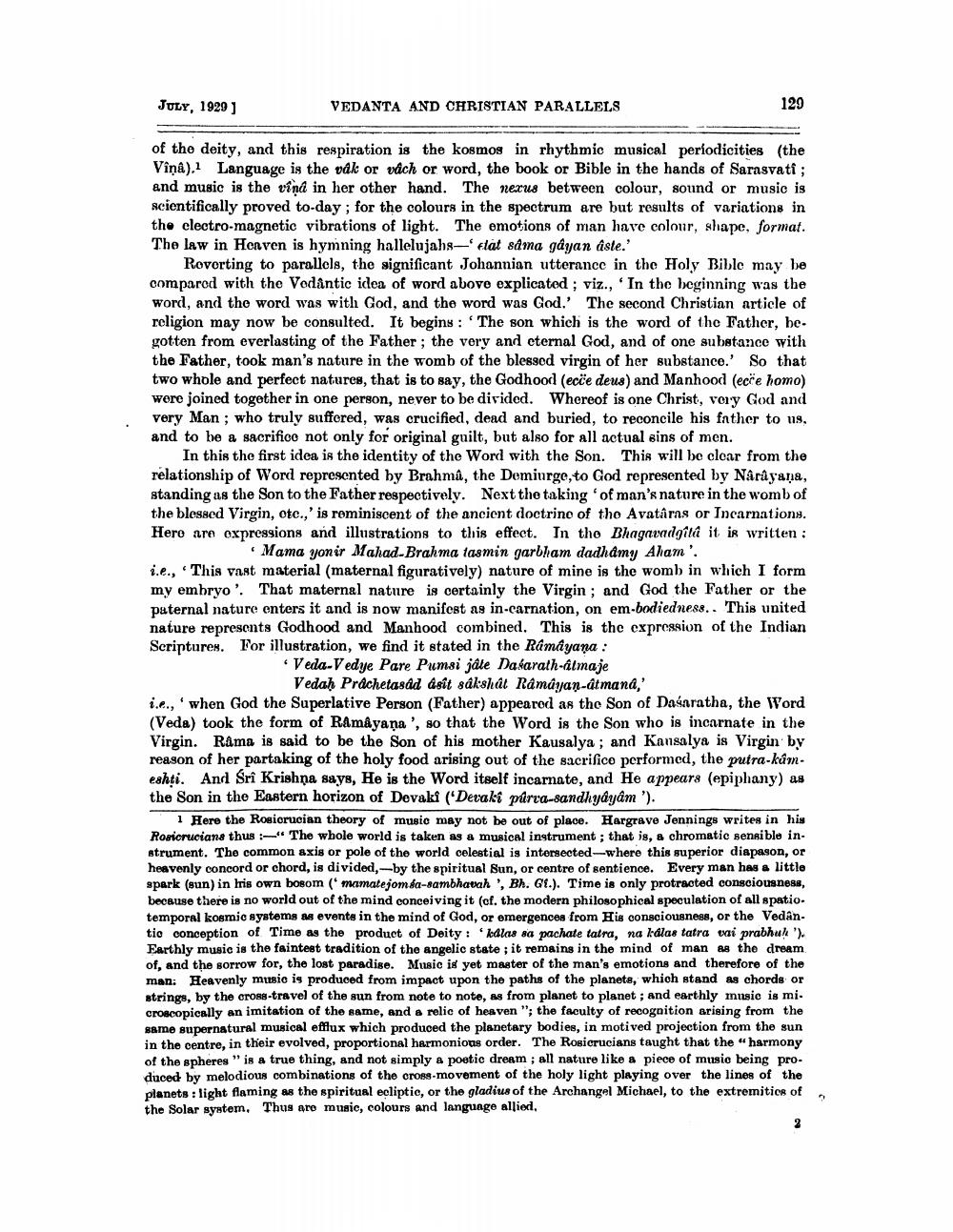________________
JULY, 1929 ]
VEDANTA AND CHRISTIAN PARALLELS
129
of the deity, and this respiration is the kosmos in rhythmic musical periodicities (the Viņa).1 Language is the vak or vách or word, the book or Bible in the hands of Sarasvati; and music is the vind in her other hand. The nexus between colour, sound or music is scientifically proved to-day; for the colours in the spectrum are but results of variations in the clectro-magnetic vibrations of light. The emotions of man have colour, shape, format. The law in Honven is hymning hallelujahs-Flat sama gayan aste.'
Rovorting to parallels, the significant Johannian utterance in the Holy Bible may be compared with the Vedantic idea of word above explicated ; viz., In the beginning was the word, and the word was with God, and the word was God.' The second Christian article of religion may now be consulted. It begins : The son which is the word of the Father. be. gotten from everlasting of the Father; the very and eternal God, and of one substance with the Father, took man's nature in the womb of the blessed virgin of her substance.' So that two whole and perfect natures, that is to say, the Godhood (ecöe deus) and Manhood (ecie homo) were joined together in one person, never to be divided. Whereof is one Christ, voy God and very Man ; who truly suffered, was crucified, dead and buried, to reconcile his father to us, and to be a sacrifico not only for original guilt, but also for all actual sins of men.
In this the first idea is the identity of the Word with the Son. This will be clear from the relationship of Word represented by Brahmâ, the Demiurge, to God represented by Narayana, standing as the Son to the Father respectively. Next the taking of man's nature in the womb of the blessed Virgin, otc.,' is reminiscent of the ancient doctrine of tho Avataras or Incarnations. Here are oxpressions and illustrations to this effect. In the Bhagavadgita it is written :
Mama yonir Mahad-Brahma tasmin garbham dadhamy Aham'. i.e., This vast material (maternal figuratively) nature of mine is the womb in which I form my embryo'. That maternal nature is certainly the Virgin; and God the Father or the paternal nature enters it and is now manifest as in-carnation, on em-bodiednes8.. This united nature represents Godhood and Manhood combined. This is the expression of the Indian Scriptures. For illustration, we find it stated in the Ramayana :
Veda-V edye Pare Pumsi jate Dakarath-almaje
Vedah Prachetasád asit sakshat Ramayan-atmand,' i...,' when God the Superlative Person (Father) appeared as the Son of Dasaratha, the Word (Veda) took the form of Ramayana', so that the Word is the Son who is incarnate in the Virgin. Råma is said to be the Son of his mother Kausalya ; and Kausalya is Virgin by reason of her partaking of the holy food arising out of the sacrifice performed, the putra-kámeshti. And Sri Krishna says, He is the Word itself incarnate, and He appears (epiphany) as the Son in the Eastern horizon of Devaki ('Devaki purva-sandhyáyâm ').
1 Here the Rosicrucian theory of music may not be out of place. Hargrave Jennings writes in his Rosicrucians thus : The whole world is taken as a musical instrument; that is, & chromatic sensible in. strument. The common axis or pole of the world celestial is intersected-where this superior diapason, or heavenly concord or chord, is divided, -by the spiritual Sun, or centre of sentience. Every man has a little spark (sun) in Iris own bosom (* mamatejomka-sambhavah, Bh. Gi.). Time is only protracted consciousness, because there is no world out of the mind conceiving it (cf. the modern philosophical speculation of all spatio. temporal kosmic systems as events in the mind of God, or emergences from His consciousness, or the Vedan. tio conception of Time as the product of Deity : kalas sa pachate tatra, na kalas tatra vai prabhu'). Earthly music is the faintest tradition of the angelic state: it remains in the mind of man as the dream of, and the sorrow for, the lost paradise. Music is yet master of the man's emotions and therefore of the man: Heavenly music is produced from impact upon the paths of the planeta, which stand as chords or strings, by the cross-travel of the sun from note to note, as from planet to planet; and earthly music is mi. croscopically an imitation of the same, and a relic of heaven"; the faculty of recognition arising from the same supernatural musical efflux which produced the planetary bodies, in motived projection from the sun in the centre, in their evolved, proportional harmonious order. The Rosicrucians taught that the "harmony of the spheres" is a true thing, and not simply & poetic dream; all nature like a piece of musio being produced by melodious combinations of the cross-movement of the holy light playing over the lines of the planets : light flaming as the spiritual ecliptic, or the gladius of the Archangel Michael, to the extremitics of the Solar system. Thus are music, colours and language allied,




